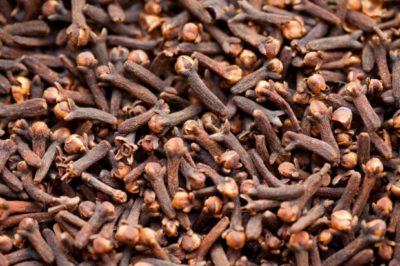Cloves As An Antifungal Treatment

This dark, pungent spice isn’t just a decoration for the Thanksgiving turkey! Cloves are one of Mother Nature’s most interesting herbs, and harbor a long list of therapeutic properties. Like many other ancient spices, cloves have been used to treat a variety of ailments for hundreds of years, including indigestion, diarrhea, hernia, and ringworm.
Cloves come from the evergreen clove tree, which is native to Indonesia but now grows all over the world. It’s believed that the earliest use of cloves was by subjects of the Chinese empire in 200 BC, who chewed cloves to freshen their breath before addressing their emperor.
Table Of Contents
How Do Cloves Work?
Cloves contain a variety of antifungal constituents, including:
- Eugenol
- Eugenyl acetate
- Caryophyllene
- Iocaryophyllene
Eugenol is the most powerful of these, with antiseptic properties that have been shown to kill the Candida yeast cells. Eugenol is also an immune system stimulant, which means it helps to increase the body’s disease-fighting powers.
What Can Cloves Help With?
The powerful antifungal activity of cloves means they are used to treat a variety of fungal infections and fungal-related symptoms, such as:
- Candida overgrowth
- Athlete’s foot
- Gas
- Bloating
- Halitosis (bad breath)
- Pain
Antifungal
Studies have shown that clove essential oil is both fast and effective in killing fungal infections. A 2001 study found that clove oil had a “fast killing effect” on certain yeast cells, and its fungicidal activity on Candida albicans was similar to that of hospital-grade disinfectant such as povidone-iodine and chloroxylenol.
Another study in 2009 showed that, when used together, clove oil and eugenol oil had significant anti-fungal effects against various types of fungi, including those that had become resistant to pharmaceutical drugs such as fluconazole.
For lots more information on how to choose the right natural antifungal (there are lots!), take a look at my Ultimate Candida Diet treatment plan.
Anti-parasitic
The eugenol in cloves is believed to help fight parasites in the intestines by dissolving the outer casing of the parasitic eggs. This is even more effective when used in combination with black walnut and wormwood, as the eugenol makes it easier for the black walnut and wormwood to invade the eggs and break the lifecycle of the parasites.
Immune System Booster
The potent antiseptic qualities of the eugenol in clove oil not only kill off yeast cells, but also stimulate the production of immune cells in the body. Studies have shown that cloves can enhance the humeral immune system response, strengthening the body’s ability to ward off future infections.
How Do You Take Cloves?
Clove’s medicinal powers are in its dried buds, which contain an aromatic oil. This is where the clove essential oil is extracted from. Although clove powder is readily available, much of its potency may be lost in the manufacturing process. Clove extract is therefore most effective in the form of a food-grade essential oil.
Clove Oil Tea
To make a tea with clove essential oil, add 1 to 2 drops in warm water and drink 1-3 times daily. Be sure to dilute the essential oil, as clove extract is actually quite a powerful substance.
Clove oil also blends quite well with other essential oils. Try mixing it with other food-grade essential oils, such as basil essential oil, rosemary essential oil, rose oil, cinnamon essential oil, or even grapefruit essential oil. These may help to make your tea a little more palatable!
Topical Treatment
Clove oil may also be applied directly to fungal skin infections such as ringworm and athlete’s foot. Caution is advised when applying to sensitive skin, as clove oil is usually very strong and may cause some irritation or discomfort. Dilute the oil in water before applying.
Who Should Not Take Cloves?
Check with your doctor regarding the use of clove oil during pregnancy or breastfeeding. Those with bleeding disorders are not advised to take clove oil, nor are those with gastrointestinal issues.
It is possible for some people to have an allergic reaction to cloves, so it is best to start with a small dose and monitor your reaction. Those with an allergy to Balsam of Peru may also have a clove allergy.
Possible Side Effects Of Cloves
Cloves are a powerful spice and should never be taken in large quantities. If consumed in too great a quantity, especially in an undiluted oil, the following side effects may be experienced:
- Vomiting
- Sore throat
- Seizures
- Difficulty breathing
- Sleepiness
- Hematemesis
- Kidney Failure
- Liver damage
- Erectile dysfunction or problems with ejaculation
- Stomach irritation
It’s strongly advised to note the dosage of the clove oil and start with the smallest dose, then build up. If taken correctly, you should have no problems with using clove oil.

3-Month Candida Elimination Kit Start Your 3-month Candida Cleanse
This Candida Kit contains all the supplements recommended on the Candida Diet:
- LIVER ONE to process and remove the toxins created by Candida.
- CANDASSIST to inhibit and weaken the Candida colonies in your gut.
- PROBIOTIC to replace the Candida yeast with probiotic bacteria.
Plus... the CANDIDA DIET RECIPE BOOK with 50+ low-sugar recipes

Leave a Reply